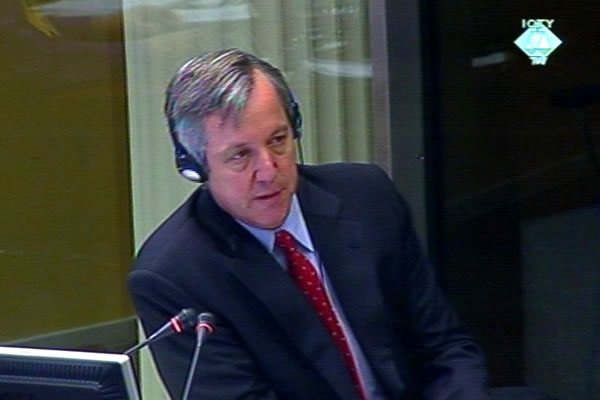Home
AKASHI WAS ‘IRRESISTIBLE’, KARADZIC ‘TOLERANT’
At the trial of Radovan Karadzic, Anthony Banbury described the terror campaign in Sarajevo, the ethnic cleansing in Banja Luka, Sanski Most and Bijeljina, and restrictions to the freedom of movement that the UN staff faced. In the cross-examination, Karadzic argued that the opposite was the case: Serbs were peace-loving and refrained from hostilities because they found Akashi ‘irresistible’ and they indulged his demands
 Anthony Banbury, witness at the Radovan Karadzic trial
Anthony Banbury, witness at the Radovan Karadzic trial Anthony Banbury, UN Secretary-General Ban Ki-moon’s assistant for field support, testifies at the trial of Radovan Karadzic. From April 1994 to May 1995, Banbury first served as political advisor to Victor Andreev, UN civil affairs officer in Sarajevo. Banbury was then appointed assistant to Yasuhi Akashi, special envoy of the UN Secretary-General to the former Yugoslavia
Banbury attended a number of meetings with Karadzic and other Bosnian Serb political and military leaders. The detailed notes Banbury kept at the meetings were admitted into evidence together with the written statement Banbury gave the OTP investigators in 2009. In the statement, Banbury described the suffering of the civilians in Sarajevo in the ‘constant campaign of artillery and sniper terror’ waged by the Bosnian Serb forces. ‘Every citizen of Sarajevo, regardless of where they lived, could be killed as soon as they stepped out into the street’, Banbury said. When French general Bernard Janvier protested against the killings of civilians at a meeting with the Serb leadership in April 1995, Karadzic told him ‘maybe some of our gunners have poor eyesight’, Banbury recounted. At the same meeting, Karadzic said, ‘Serbs have lived with Muslims for 500 years, but they don’t want to anymore’.
According to the witness, Karadzic had control over the Serb forces and once publicly demonstrated it before UNPROFOR staff, when he told them he had closed down the Sarajevo airport over the weekend to ‘show the whole world who controls it’. Karadzic and Mladic ‘were able to fine-tune the level of terror’ and used it as a ‘lever’ to control the actions of both the enemy and of UNPROFOR itself and the entire international community.
Banbury described how the Serb forces restricted the freedom of movement of the UN staff and the staff of other humanitarian organizations and disrupted the supplies to Sarajevo, Gorazde, Zepa and Bihac, whenever it suited them. On the other hand, Serbs sometimes allowed greater freedom of movement ‘to create an impression that they are the reasonable side in the conflict’. According to Banbury, Serbs let the UN in the protected areas have enough supplies to survive, letting them know that the restrictions were caused by the actions of the Bosnian government. The UN troops commanders in the field therefore tried to ‘brownnose’ the Serb forces, while they saw the Bosnian government as ‘the source of the problem’.
Prosecutor Karolyn Edgerton then brought up parts of the witness’s statement in which he spoke about the ethnic cleansing of Banja Luka, Bijeljina and Sanski Most. ‘It is clear that the expulsions based on ethnicity were an integral part of the policy pursued by the Bosnian Serbs’, the witness said. As Banbury noted, the Serbs’ goal was to achieve an ethnically pure territory where all Serbs could live ‘separately from others’. The prosecution also showed a video recording of Karadzic’s visit to Lopare on 24 March 1995. The fact that in the recording Karadzic wears a military uniform shows the Serbs were determined to end the war using military means, the witness claimed.
At the beginning of the cross-examination, Karadzic tried to show that the witness’s claims were based less on facts and more on Banbury’s ‘assessments and beliefs’. As Karadzic noted, what the UN knew about the ethnic cleansing in Banja Luka was based on ‘false’ information fed by a ‘Muslim secret organization’. Non-Serbs left their homes ‘voluntarily’ and Serbs even ‘escorted’ those who left, Karadzic said, unlike the ‘Muslim side that forced Serbs to leave with bundles in their hands’.
Karadzic tried to prove that the aim of the Sarajevo government was to expel ‘all Christians’ from BH. The witness rejected this claim. Answering a question by Judge Kwon, the witness said, ‘I believed then and believe still that the official policy of the Bosnian government was to have a multi-ethnic state’. Karadzic also noted that Serbs were cooperative, respected peace agreements and refrained from hostilities, and as for himself, ‘I often backed down...because I found Akashi irresistible’.
The cross-examination continues tomorrow morning.Linked Reports
- Case : Karadzic
- 2011-03-11 RAPE VICTIM: I WILL WAIT PATIENTLY FOR JUSTICE
- 2011-03-10 RAPE UNSUITABLE FOR POLICE REPORT
- 2011-03-09 CLIMATE OF FEAR AND TERROR IN SARAJEVO
- 2011-03-16 KARADZIC BLAMES MUSLIM PROPAGANDA
- 2011-03-17 UNPROFOR CONSIDERED TARGETING BH ARMY POSITIONS
- 2011-03-18 PRSTOJEVIC AND KARADZIC AGREE ON EVERYTHING
